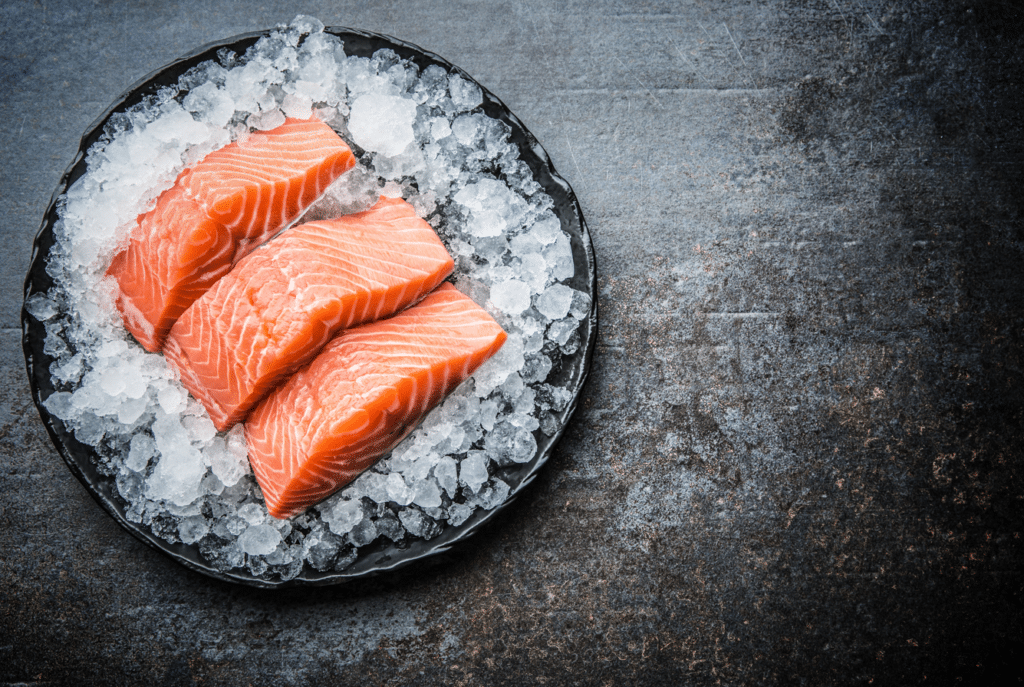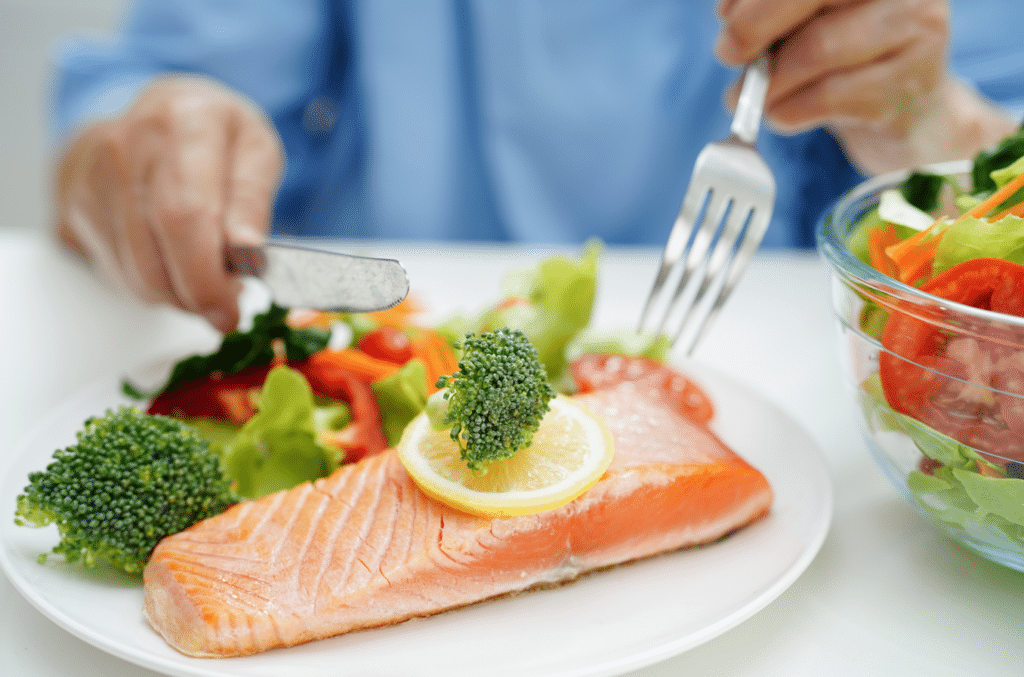- May 28, 2024
- Aws Al-Ani
- Uncategorized
Is Salmon Good for Weight Loss?

The question, “Is salmon good for weight loss?”, is a common one among health-conscious individuals and dieters. This is largely due to the nutritional profile of salmon and its role in a balanced diet.
Salmon is a silver-colored fish found in rivers and oceans, known for its rich content of protein, omega-3 fatty acids, and healthy fats. These nutrients are key factors in a healthy diet and can potentially aid in weight loss.
The Role of Salmon in Weight Loss
When considering the phrase, “Salmon is good for weight loss”, it’s important to understand how the nutrients in salmon contribute to weight loss. Protein, for instance, increases satiety and muscle mass, which can help control weight. Omega-3 fatty acids, on the other hand, are healthy fats that can make you feel full for longer, thus helping to control calorie intake.
Common Perceptions about Salmon and Weight Loss
Despite the nutritional benefits of salmon, there are some common misconceptions about its role in weight loss. Some people may be unsure about including salmon in their diet due to its fat content. However, it’s important to note that the fats in salmon are healthy fats, which are beneficial for overall health and weight management.
In conclusion, the role of salmon in weight loss is multifaceted. Its high-quality protein content, healthy fats, and other nutrients make it a valuable addition to a balanced diet aimed at weight loss. In the following sections, we will delve deeper into the nutritional profile of salmon and debunk common myths about salmon and weight loss.
Nutritional Profile of Salmon

When considering the question, “Is salmon good for weight loss?”, it’s crucial to understand the nutritional profile of salmon. Salmon is a nutrient-dense food, packed with high-quality protein, omega-3 fatty acids, and a variety of vitamins and minerals.
Protein Content
Salmon is an excellent source of high-quality protein. A 3.5-ounce serving of wild salmon provides about 25 grams of protein, while farmed salmon offers around 22 grams. Protein plays a vital role in weight loss as it increases satiety, helps build and maintain muscle mass, and boosts metabolism.
Omega-3 Fatty Acids
One of the key reasons why “salmon is good for weight loss” is its high content of omega-3 fatty acids. A 3.5-ounce serving of salmon contains about 2.3 grams of long-chain omega-3 fatty acids, including EPA and DHA. These healthy fats are known to reduce inflammation, support brain health, and help you feel full for longer, thus aiding in weight management.
Vitamins and Minerals
Salmon is rich in several essential vitamins and minerals. It is one of the few natural food sources of vitamin D and is also high in B vitamins, including B12 and niacin. Additionally, salmon provides a good amount of selenium, a mineral involved in DNA synthesis, thyroid hormone metabolism, and reproductive health. These nutrients not only contribute to overall health but also aid in weight loss by supporting metabolic function.
Fat Content
While salmon does contain fat, it’s important to note that these are healthy fats. A 3-ounce serving of raw salmon has 5.4 grams of fat, of which about 1.5 grams are beneficial omega-3 fatty acids. These healthy fats, along with the polyunsaturated and monounsaturated fats in salmon, contribute to satiety and can help control calorie intake, thus supporting weight loss.
In conclusion, the nutritional profile of salmon makes it a valuable addition to a weight loss diet. In the following sections, we will debunk common myths about salmon and weight loss.
Click here to explore the importance of nutrition for kids
Debunking Myths about Salmon and Weight Loss

When it comes to the question, “Is salmon good for weight loss?”, there are several myths that need to be addressed. Let’s debunk these misconceptions and set the record straight.
Myth 1 – Salmon is High in Fat and Therefore Not Good for Weight Loss
One common myth is that because salmon is high in fat, it’s not good for weight loss. However, the truth is that the fats in salmon are healthy fats, including omega-3 fatty acids. These fats are known to reduce inflammation, support brain health, and help you feel full for longer, thus aiding in weight management.
Myth 2 – All Salmon Varieties Have the Same Nutritional Profile
Another misconception is that all varieties of salmon have the same nutritional profile. In reality, the nutritional information of salmon may vary depending on multiple factors, including the type of salmon, the portion size, and the preparation method.
Myth 3 – Eating Salmon Will Instantly Lead to Weight Loss
The phrase “Salmon is good for weight loss” often leads to the misconception that consuming salmon will instantly lead to weight loss. The truth is, while salmon can contribute to steady and healthy weight loss, it’s not a magic bullet. Weight loss involves a combination of a balanced diet and regular physical activity.
Myth 4 – Salmon Only Contributes to Weight Loss Through Its Protein Content
Some people believe that salmon only contributes to weight loss through its protein content. While it’s true that salmon is an excellent source of protein, which can increase satiety and prevent overeating, it’s not the only way salmon aids in weight loss. Salmon is also rich in other essential nutrients like omega-3 fatty acids and vitamins, which play crucial roles in weight management.
In conclusion, while salmon is indeed beneficial for weight loss, it’s important to have a clear understanding of how it contributes to a healthy diet and weight management. In the following section, we will provide practical advice on how to include salmon in a weight loss diet.
Incorporating Salmon into a Weight Loss Diet

When considering the question, “Is salmon good for weight loss?”, it’s important to understand how to incorporate salmon into a weight loss diet. Salmon can be a versatile and delicious addition to your meals, and with the right portion sizes, preparation methods, and frequency of consumption, it can contribute to healthy weight loss.
Preparation Methods
The way you prepare salmon can significantly impact its nutritional value and its role in weight loss. Grilling, baking, steaming, or poaching salmon are healthy cooking methods.
Frequency of Consumption
While salmon is a healthy choice, it’s important to consume it in moderation as part of a balanced diet. Consuming salmon two to three times a week can provide a good balance of protein, omega-3 fatty acids, and other nutrients without contributing excessive calories.
Versatile Ways to Include Salmon in Your Diet
Salmon can be incorporated into a multitude of dishes. You can add it to salads, zucchini noodles, and cauliflower rice dishes. You can also make salmon lettuce wraps or patties
In conclusion, the phrase “Salmon is good for weight loss” holds true when you incorporate salmon into your diet in a balanced and healthy way. Remember, weight loss is not just about one single food but about a balanced and nutritious diet combined with regular physical activity.
Check out our article exploring the link between Weight Loss and Blood Sugar Levels
Interested in Speaking With an Expert Weight Loss GP?

Meet Dr. Avi Charlton, a dedicated GP whose experienced in weight loss. Book a free call today and start your journey to a healthier, fitter you with expert guidance tailored to your needs!
Ready to Begin Your Journey?
Start your path to better health today with Melbourne Low Carb Clinic. Book your free call now and take the first step towards a healthier you!
Book Free Discovery CallThank You for Reading!
References:
Introduction to Salmon and Weight Loss:
Nutritional Profile of Salmon:
- https://www.medicalnewstoday.com
- https://www.verywellfit.com
- https://www.healthline.com
- https://www.precisionnutrition.com
Debunking Myths about Salmon and Weight Loss:
Incorporating Salmon into a Weight Loss Diet:

